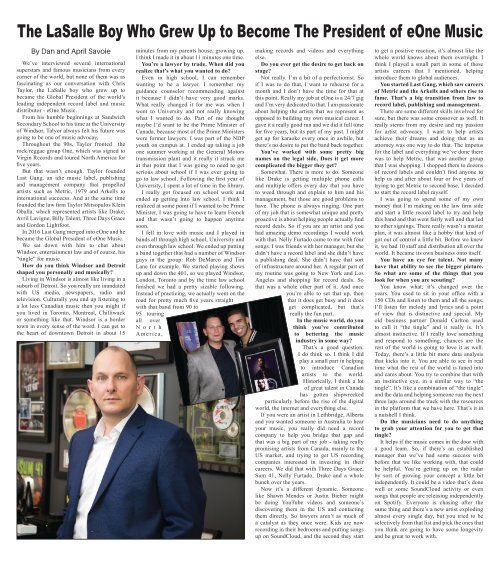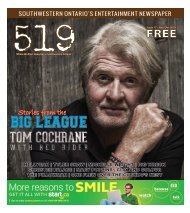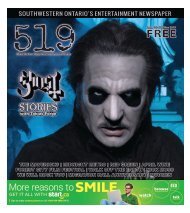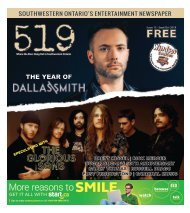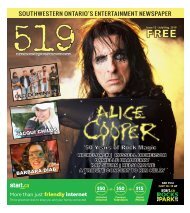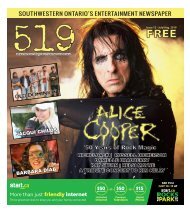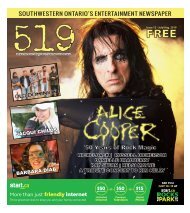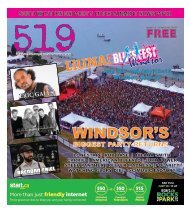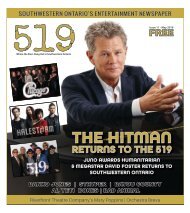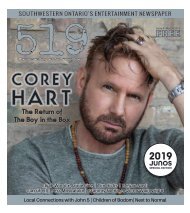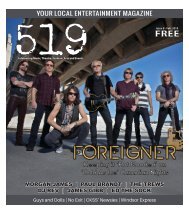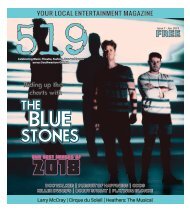519 Magazine - April 2019
- No tags were found...
You also want an ePaper? Increase the reach of your titles
YUMPU automatically turns print PDFs into web optimized ePapers that Google loves.
The LaSalle Boy Who Grew Up to Become The President of eOne Music<br />
By Dan and <strong>April</strong> Savoie<br />
We’ve interviewed several international<br />
superstars and famous musicians from every<br />
corner of the world, but none of them was as<br />
fascinating as our conversation with Chris<br />
Taylor, the LaSalle boy who grew up to<br />
became the Global President of the world’s<br />
leading independent record label and music<br />
distributor - eOne Music.<br />
From his humble beginnings at Sandwich<br />
Secondary School to his time at the University<br />
of Windsor, Talyor always felt his future was<br />
going to be one of music advocay,<br />
Throughout the 90s, Taylor fronted the<br />
rock/reggae group One, which was signed to<br />
Virgin Records and toured North America for<br />
five years.<br />
But that wasn’t enough. Taylor founded<br />
Last Gang, an idie music label, publishing<br />
and management company that propelled<br />
artists such as Metric, 1979 and Arkells to<br />
international succecss. And at the same time<br />
founded the law firm Taylor Mitsopulos Klein<br />
Oballa, which represented artists like Drake,<br />
Avril Lavigne, Billy Talent, Three Days Grace<br />
and Gordon Lightfoot.<br />
In 2016 Last Gang merged into eOne and he<br />
became the Global President of eOne Music.<br />
We sat down with him to chat about<br />
Windsor, entertainment law and of course, his<br />
“tingle” for music.<br />
How do you think Windsor and Detroit<br />
shaped you personally and musically?<br />
Living in Windsor is almost like living in a<br />
suburb of Detroit. So you really are inundated<br />
with US media, newspapers, radio and<br />
television. Culturally you end up listening to<br />
a lot less Canadian music then you might if<br />
you lived in Toronto, Montreal, Chilliwack<br />
or something like that. Windsor is a border<br />
town in every sense of the word. I can get to<br />
the heart of downtown Detroit in about 15<br />
minutes from my parents house, growing up.<br />
I think I made it in about 11 minutes one time.<br />
You’re a lawyer by trade. When did you<br />
realize that’s what you wanted to do?<br />
Even in high school, I can remember<br />
wanting to be a lawyer. I remember my<br />
guidance counselor recommending against<br />
it because I didn’t have very good marks.<br />
What really changed it for me was when I<br />
went to University and not really knowing<br />
what I wanted to do. Part of me thought<br />
maybe I’d want to be the Prime Minister of<br />
Canada, because most of the Prime Ministers<br />
were former lawyers. I was part of the NDP<br />
youth on campus at. I ended up taking a job<br />
one summer working at the General Motors<br />
transmission plant and it really it struck me<br />
at that point that I was going to need to get<br />
serious about school if I was ever going to<br />
go to law school. Following the first year of<br />
University, I spent a lot of time in the library.<br />
I really got focused on school work and<br />
ended up getting into law school. I think I<br />
realized at some point if I wanted to be Prime<br />
Minister, I was going to have to learn French<br />
and that wasn’t going to happen anytime<br />
soon.<br />
I fell in love with music and I played in<br />
bands all through high school, University and<br />
even through law school. We ended up putting<br />
a band together that had a number of Windsor<br />
guys in the group: Rob DeMarco and Tim<br />
Lane for example. We started playing shows<br />
up and down the 401, so we played Windsor,<br />
London, Toronto and by the time law school<br />
finished we had a pretty sizable following.<br />
Instead of practicing, we actually went on the<br />
road for pretty much five years straight<br />
with that band from 90 to<br />
95 touring<br />
all over<br />
N o r t h<br />
America,<br />
making records and videos and everything<br />
else.<br />
Do you ever get the desire to get back on<br />
stage?<br />
Not really. I’m a bit of a perfectionist. So<br />
if I was to do that, I want to rehearse for a<br />
month and I don’t have the time for that at<br />
this point. Really my job at eOne is a 24/7 gig<br />
and I’m very dedicated to that. I am passionate<br />
about helping the artists that we represent as<br />
opposed to building my own musical career. I<br />
gave it a really good run and we did it full time<br />
for five years, but its part of my past. I might<br />
get up for karaoke every once in awhile, but<br />
there’s no desire to put the band back together.<br />
You’ve worked with some pretty big<br />
names on the legal side, Does it get more<br />
complicated the bigger they get?<br />
Somewhat. There is more to do. Someone<br />
like Drake is getting multiple phone calls<br />
and multiple offers every day that you have<br />
to weed through and explain to him and his<br />
management, but those are good problems to<br />
have. The phone is always ringing. One part<br />
of my job that is somewhat unique and pretty<br />
proactive is about helping people actually find<br />
record deals. So if you are an artist and you<br />
had amazing demo recordings I would work<br />
with that. Nelly Furtado came to me with four<br />
songs. I was friends with her manager, but she<br />
didn’t have a record label and she didn’t have<br />
a publishing deal. She didn’t have that sort<br />
of infrastructure around her. A regular part of<br />
my routine was going to New York and Los<br />
Angeles and shopping for record deals. So<br />
that was a whole other part of it. And once<br />
you’re able to set that up, then<br />
that it does get busy and it does<br />
get complicated, but that’s<br />
really the fun part.<br />
In the music world, do you<br />
think you’ve contributed<br />
to bettering the music<br />
industry in some way?<br />
That’s a good question.<br />
I do think so. I think I did<br />
play a small part in helping<br />
to introduce Canadian<br />
artists to the world.<br />
Historically, I think a lot<br />
of great talent in Canada<br />
has gotten shipwrecked<br />
particularly before the rise of the digital<br />
world, the internet and everything else.<br />
If you were an artist in Lethbridge, Alberta<br />
and you wanted someone in Australia to hear<br />
your music, you really did need a record<br />
company to help you bridge that gap and<br />
that was a big part of my job - taking really<br />
promising artists from Canada, mainly to the<br />
US market, and trying to get US recording<br />
companies interested in investing in their<br />
careers. We did that with Three Days Grace,<br />
Sum 41, Nelly Furtado, Drake and a whole<br />
bunch over the years.<br />
Now it’s a different dynamic. Someone<br />
like Shawn Mendes or Justin Bieber might<br />
be doing YouTube videos and someone’s<br />
discovering them in the US and contacting<br />
them directly. So lawyers aren’t as much of<br />
a catalyst as they once were. Kids are now<br />
recording in their bedrooms and putting songs<br />
up on SoundCloud, and the second they start<br />
to get a positive reaction, it’s almost like the<br />
whole world knows about them overnight. I<br />
think I played a small part in some of those<br />
artists careers that I mentioned, helping<br />
introduce them to global audiences.<br />
You started Last Gang, which saw careers<br />
of Metric and the Arkells and others rise to<br />
fame. That’s a big transition from law to<br />
record label, publishing and management.<br />
There are some different skills involved for<br />
sure, but there was some crossover as well. It<br />
really stems from my desire and my passion<br />
for artist advocacy. I want to help artists<br />
achieve their dreams and doing that as an<br />
attorney was one way to do that. The impetus<br />
for the label and everything we’ve done there<br />
was to help Metric, that was another group<br />
that I was shopping. I shopped them to dozens<br />
of record labels and couldn’t find anyone to<br />
help us and after about four or five years of<br />
trying to get Metric to second base, I decided<br />
to start the record label myself.<br />
I was going to spend some of my own<br />
money that I’m making on the law firm side<br />
and start a little record label to try and help<br />
this band and that went fairly well and that led<br />
to other signings. There really wasn’t a master<br />
plan, it was almost like a hobby that kind of<br />
got out of control a little bit. Before we knew<br />
it, we had 10 staff and distribution all over the<br />
world. It became its own business onto itself.<br />
You have an eye for talent. Not many<br />
have that ability to see the bigger picture.<br />
So what are some of the things that you<br />
look for when you are scouting?<br />
You know what; it’s changed over the<br />
years. You used to sit in your office with a<br />
150 CDs and listen to them and all the songs.<br />
I’ll listen for melody and lyrics and a point<br />
of view that is distinctive and special. My<br />
old business partner Donald Carlton used<br />
to call it “the tingle” and it really is. It’s<br />
almost instinctive. If I really love something<br />
and respond to something, chances are the<br />
rest of the world is going to love it as well.<br />
Today, there’s a little bit more data analysis<br />
that kicks into it. You are able to see in real<br />
time what the rest of the world is tuned into<br />
and cares about. You try to combine that with<br />
an instinctive eye, in a similar way to “the<br />
tingle”. It’s like a combination of “the tingle”<br />
and the data and helping someone run the next<br />
three laps around the track with the resources<br />
in the platform that we have here. That’s it in<br />
a nutshell I think.<br />
Do the musicians need to do anything<br />
to grab your attention for you to get that<br />
tingle?<br />
It helps if the music comes in the door with<br />
a good team. So, if there’s an established<br />
manager that we’ve had some success with<br />
before that we like working with, that could<br />
be helpful. You’re getting up on the radar<br />
by sort of proving your concept a little bit<br />
independently. It could be a video that’s done<br />
well or some SoundCloud activity or even<br />
songs that people are releasing independently<br />
on Spotify. Everyone is chasing after the<br />
same thing and there’s a new artist exploding<br />
almost every single day, but you tried to be<br />
selectively from that list and pick the ones that<br />
you think are going to have some longevity<br />
and be great to work with.


